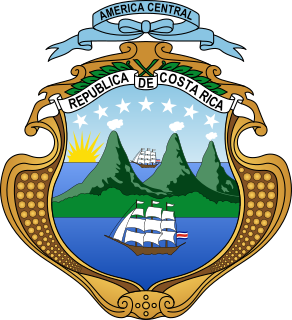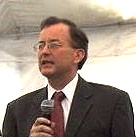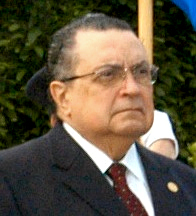Candidates
There were fourteen candidates running for the presidency in the 2006 elections. However, only a few rose in the polls above the error margin.
Óscar Arias
Arias had been seen as the front runner throughout the campaign. Arias served as President of Costa Rica from 1986 to 1990. He is best known worldwide for his role in the signing of the Esquipulas Peace Agreement which is regarded as the crucial plan which led to the eventual end to the series of civil wars that took place throughout Central America, most notably in Nicaragua, El Salvador, and Guatemala, during the 1980s. For his role he was awarded the Nobel Peace Prize in 1987. With the monetary portion of the award he started the Arias Foundation for Peace and Human Progress, an advocacy group for demilitarization, women's rights and conflict resolution through dialogue. Through this group Arias helped to settle conflicts throughout Latin America, participating in the process to demilitarize Haiti and Panama. [2]

The President of Costa Rica is the head of state and head of government of Costa Rica. The President is currently elected in direct elections for a period of four years, which is not immediately renewable. Two Vice presidents are elected in the same ticket with the president. The president appoints the Council of Ministers. Due to the abolition of the military of Costa Rica in 1948, the president is not a Commander-in-chief, unlike the norm in most other countries, although the Constitution does describe him as commander in chief of the civil defense public forces.
The Esquipulas Nicaraguan Peace Agreement, also known as the Central American Peace Accords, was a peace initiative in the mid-1980s to settle the military conflicts that had plagued Central America for many years, and in some cases for decades. It built upon groundwork laid by the Contadora Group from 1983 to 1985. The agreement was named for Esquipulas, Guatemala, where the initial meetings took place. The US Congress lobbying efforts were helped by one of Capitol Hill's top lobbyists, William C. Chasey.

The Nobel Peace Prize is one of the five Nobel Prizes established by the will of Swedish industrialist, inventor, and armaments manufacturer Alfred Nobel, along with the prizes in Chemistry, Physics, Physiology or Medicine, and Literature. Since March 1901, it has been awarded annually to those who have "done the most or the best work for fraternity between nations, for the abolition or reduction of standing armies and for the holding and promotion of peace congresses".
Arias made the fight against poverty and corruption the headlining issues of his campaign. During public appearances he promised to provide scholarships to poor families so their children could stay in school and not have to work (a promise he fulfilled on his first day in office), and spoke about the urgency of signing the Central American Free Trade Agreement in order to create high-paying jobs for Costa Rica's youth. [3]
With the pre-election opinion polls favoring Óscar Arias, he did not foresee such stiff competition from his closest rival Ottón Solís. At first count, there was a difference of only 0.4% (Óscar Arias = 40.6% vs Ottón Solís = 40.2%), or about 3,200 votes. Large numbers of voters supporting candidates other than Óscar Arias and Ottón Solís chose to cast their ballot for Ottón Solís at the last minute, with the objective of keeping Óscar Arias from winning the elections.
Election laws in Costa Rica dictate, among other things, that a candidate requires 40% of the votes to avoid a second round of voting for election of the President. Further, in case of a tie with candidates having the same number of votes, the elder of the two wins the seat.
Ottón Solís
Solís was the candidate of the Citizens' Action Party (PAC). Solís is a co-founder of the party and was its candidate in the 2002 presidential elections. In that election he ran against Rolando Araya of the National Liberation Party (PLN) and Abel Pacheco of the Social Christian Unity Party (PUSC). On 3 February 2002 the first round was held, in which Solís lost. He was running in an effort to break up the two-party system in Costa Rica. [4]

Ottón Solís Fallas is a Costa Rican politician. He graduated with a Bachelor of Economics from the University of Costa Rica in 1976 and gained a Master's Degree in Economics from the University of Manchester in 1978. He is currently serving his second term as deputy, was a founding member of the Citizens' Action Party, and ran as its three-time presidential candidate. As an academic, he has taught at several universities in the United States and Costa Rica.

The Citizens' Action Party is a center-left political party in Costa Rica.

The Social Christian Unity Party is a centre-right political party in Costa Rica.
Solís is a critic of the Central American Free Trade Agreement (CAFTA). He has called for the renegotiations of CAFTA to add protection for vulnerable farmers and industrial companies. He has said that in its current form, "CAFTA will increase poverty in Central America because it will displace farmers and industrial workers and will increase the cost of health care." [5] He also said that "I never imagined CAFTA was going to be so one sided," and "The law of the jungle benefits the big beast. We are a very small beast." [6] Solís sees several possible detrimental aspects that could come from CAFTA. First he claims that it will cause the breakup of the public telecommunications and electricity monopolies which will have to be privatized. Additionally he thinks that the lowered trade barriers will cause a flood of cheap food products from the United States to come in and this will hurt the internal market for small-scale farmers. [7]

The United States of America (USA), commonly known as the United States or America, is a country composed of 50 states, a federal district, five major self-governing territories, and various possessions. At 3.8 million square miles, the United States is the world's third or fourth largest country by total area and is slightly smaller than the entire continent of Europe's 3.9 million square miles. With a population of over 327 million people, the U.S. is the third most populous country. The capital is Washington, D.C., and the largest city by population is New York City. Forty-eight states and the capital's federal district are contiguous in North America between Canada and Mexico. The State of Alaska is in the northwest corner of North America, bordered by Canada to the east and across the Bering Strait from Russia to the west. The State of Hawaii is an archipelago in the mid-Pacific Ocean. The U.S. territories are scattered about the Pacific Ocean and the Caribbean Sea, stretching across nine official time zones. The extremely diverse geography, climate, and wildlife of the United States make it one of the world's 17 megadiverse countries.
Otto Guevara
Otto Guevara Guth is the co-founder, along with Rigoberto Stewart and Raúl Costales Domínguez, of the Movimiento Libertario, a libertarian party. He was elected to the legislature in 1998. Guevara originally ran as a libertarian politician who claimed to believe in cutting of government programs, which he saw as excessive. Some of these programs included government subsidies for food, US$10,000 subsidies for housing, and free textbooks paid for by the state. He also rejected government funding for the party's political campaigns. [8]
For the 2006 election, a faction of the Movimiento Libertario led by Guevara took control of the party and backed down on many of the party's initial positions. They have decided to accept government funding, which was previously qualified by him as immoral, and on several interviews he has claimed that public education needs to be strengthened by more funding, that the country needs to build more jails, and several other issues that will actually increase government spending.
On the foreign policy front, Guevara is in favor of advancing civil liberties abroad. He is a critic of the Castro government in Cuba, accusing politicians in Latin America of being accomplices to the lack of political liberty by not speaking out against the country's government. Guevara has linked the lack of political liberties in Cuba to what he sees as an overextension of the state in Costa Rica. Specifically he sees that eliminating regulations which, according to him, affect the development of the economy, as being a part of his program to protect political liberty. Specifically he sees regulations on agroindustry as being a considerable problem. [9]
He hasn't yet made clear if his position on these issues changed along with the others. Given that his position on Cuba was likely the result of influence by Raúl Costales, an exiled Cuban who was one of the party founders and a long-time party secretary, and that he separated himself from the party after they voted to accept money from the government, it's likely Guevara's foreign policy has changed.
Ricardo Toledo
Toledo is the candidate for the ruling Social Christian Unity Party (PUSC) and used to be a close friend of president Abel Pacheco. He has a long history within the party as, among other things, President of the Youth of the Social Christian Unity Party, Coordinator of the party's southern districts, the head of management for the party, and senior officer and Vice-minister of the Ministry of Labor. He has also served in the legislature. [10]
Antonio Álvarez
Antonio Álvarez is the candidate for the party that he heads, the Union for Change Party (UPC).
He is running on a platform of political change. In an interview with newspaper Al Día Álvarez said that one thing that he believes negatively affects the country is unregulated immigration of Nicaraguans. He recommends stricter penalties for employers of immigrants who might be exploiting the Nicaraguans for cheap labor, and for increased use of documentation for immigrants.
On the economic front, Álvarez is interested in helping to build infrastructure because he believes it is essential to the continued economic development of Costa Rica. He is in favor of using the grant of public work and the emergency road network plan to build up the highways. He believes that a major problem with the health system is that it is inadequately funded and that violators are not penalized. Specifically he points to businesses who are not paying in order to have enough money to fund changes to the medical system. He is not in favor of legalizing same-sex marriage but is in favor of extending the benefits of marriage over to a civil union. In order to fight corruption in the municipalities and to ensure that money reaches the level that it is supposed to, Álvarez recommends more oversight in the hiring process so that the most qualified and honest people are in the positions where money distribution is involved. He is in favor of programs which encourage entrepreneurship, especially among the younger generation. Also for college students, he is not in favor of eliminating exams for the baccalaureate, but rather wants to expand education through increased infrastructure, new programs including secondary schools, and diversifying education through the regions. [11]




























